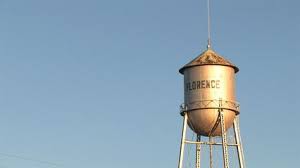Andrea B. Scott is a Brooklyn-based documentary filmmaker, editor, and writer. She was an editor and an associate producer on A Place at the Table, directed by Kristi Jacobson and Lori Silverbush, which premiered at the Sundance Film Festival in January 2012. Prior to that, Scott worked for three years as an associate producer and assistant editor for Academy Award-winning documentary filmmaker Cynthia Wade. She is currently editing the CNN documentary film Fresh Dressed. (Press materials)
Her first feature-length film, Florence, Arizona, will play at DOC NYC on November 14 and 19.
W&H: Please give us your description of the film playing.
AS: Florence, Arizona is about a small cowboy town in the middle of the desert with 9 prisons and a whole lot of interesting characters.
W&H: What drew you to this story?
AS: Back in September 2010, my close friend David showed me a series of photographs he had taken out west of “this small town in rural Arizona with nine prisons.” It piqued something inside of me — a sense of outrage and bewilderment, but also a deep sense of wonder and curiosity. Here, in his images, was a McDonald’s with an Immigration Detention Center in its shadows. There was also a Sonic drive-through with orange-suited men peering out of barred windows in between its lined-up pick-up trucks.
It struck me: How exactly did these juxtapositions play out in everyday life? What did the presence of nine correctional facilities do to a place and the people who call it home? I went out to Florence a few months later with a camera and a couple of friends. I fell in love with the place and the people and the sense of Americana that I found there.
W&H: What was the biggest challenge in making the film?
AS: The biggest challenge in making the film was in translating to the people of Florence — and to people in general — the tone and approach that the film was going to take to the town and specifically to the prisons. In Florence, most people either assumed we were making a film about the prisons (to which many people took offense) or the town’s history (which is quite interesting). For most non-Florentinos, the assumption generally was that we were making a film denigrating the prison-industrial complex.
In truth, we were interested in all of those things — the prisons, the town’s history, the consequences of a prison economy; we just weren’t interested in communicating about those topics in a very direct or traditional manner. We wanted to tell these stories through the people of the town and through the character of the town itself, then let audiences make their own assessments. Accordingly, in the production and the edit of the film, we had to work hard to strike the right balance of all these elements and find the film’s true tone.
W&H: What do you want people to think about when they are leaving the theater?
AS: I generally don’t want to put ideas in people’s heads as to what they should take away from the film. Like anything, people will interpret the film through their own subjective experience of the world. But I hope people will contemplate their own preconceived notions of “good” and “bad,” as well as the consequences for a society based on that dichotomy.
W&H: What advice do you have for other female directors?
AS: Trust your gut, trust your instincts, and trust in your ability to carry through on your vision.
W&H: What’s the biggest misconception about you and your work?
AS: The biggest misconception about the film is that it will be a hard-hitting exposé of the prison-industrial complex. It’s really a more nuanced, thoughtful approach to a very big and serious subject — and it’s funny, too.
W&H: How did you get your film funded?
AS: The film was funded primarily through the grant-making foundations The Vital Projects Fund and The Bertha Foundation. We also raised some very important finishing funds through Kickstarter. I was lucky enough to have some great friends who lent me camera and audio equipment to use throughout the making of the film, and I was also extremely fortunate to have the support of a few key individuals who believed in me from the very beginning.
W&H: Name your favorite women directed film and why.
Sarah Polley’s Take This Waltz. I think Polley was really able to get to the heart of some deep and honest truths about the human experience while imbuing the film with a sense of warmth, humor, and the vibrancy of life. Plus, I had a good cry, and I love a good cry at the movies.







